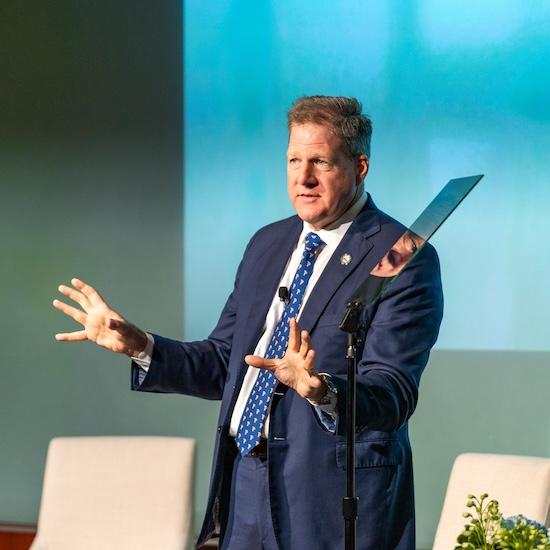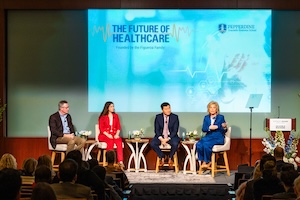New Hampshire Governor Christopher T. Sununu and Industry Experts Discuss Meeting the Nation’s Healthcare Challenges at Annual Future of Healthcare Symposium

On Thursday, February 29, 2024, the Pepperdine Graziadio Business School hosted the ninth annual Future of Healthcare Symposium, “Elevating Healthcare: Exploring Solutions for the Future.” The event’s keynote speaker, New Hampshire governor Christopher T. Sununu, addressed state and federal government opportunities in the field of healthcare. Noting that the key to earning public trust in the healthcare arena is to ensure local control and create accessibility, he offered details on several programs that have positively influenced New Hampshire’s healthcare system and how the success of these initiatives can inform national policies.
 Sununu focused on the multitude of successful initiatives surrounding mental health
and substance abuse disorders that have positively impacted the health and well-being
of New Hampshire residents. When he became governor in 2016, New Hampshire’s citizens
were experiencing an alarming number of opioid deaths. The state’s data revealed addiction
rates in rural New Hampshire that were four times higher than the state’s major cities,
but limited access to treatment centers isolated those in need from getting help.
Sununu focused on the multitude of successful initiatives surrounding mental health
and substance abuse disorders that have positively impacted the health and well-being
of New Hampshire residents. When he became governor in 2016, New Hampshire’s citizens
were experiencing an alarming number of opioid deaths. The state’s data revealed addiction
rates in rural New Hampshire that were four times higher than the state’s major cities,
but limited access to treatment centers isolated those in need from getting help.
Sununu pioneered recovery programs such as the Doorway System and the Recovery Friendly Workplace Initiative, providing a variety of treatment services that are accessible and offer a long-term support system. He explained the key to New Hampshire’s progress is having nimble government involvement and enacting policies that allow for local decisions to be implemented.
“While it’s important to examine the role national healthcare plays in this epidemic, my goal was to identify the root cause of the problem and focus on what I could do immediately at a state level to address potential solutions,” he said.
In a Q and A moderated by Patrick Khoury (MBA '96), member of the Graziadio Board, Sununu shared no “one-size-fits-all” solution to healthcare issues exists, as each state has its own unique set of challenges and needs, however, more data and innovative ideas on a state level could help inform the federal government actions. He added that national healthcare policies are in need of an overhaul. “We're not going to have a healthy discussion on the cost of healthcare until the crisis hits,” Sununu said. “It's just going to keep getting worse on a national level, because no one at the executive level is comfortable taking this problem head-on.” He continued, “If you have a bad model, and you throw more money at it, you're only pushing harder in the wrong direction. Sometimes you have to have the courage to say we need to redirect.”

Following the governor’s talk, Dee Anna Smith ('86), chair of the University Board of Regents and CEO of the Sarah Cannon Research Institute, moderated a conversation with panelists and industry experts Robert Geyer (MBA '89), senior advisor to the CEO for Medica; Randy Hyun, the chief executive officer of CarepathRx; and Rachel Zayas, founder and CEO of AGED Diagnostics, who explored the barriers to accessible healthcare, the future of artificial intelligence’s (AI) contributions to the field, and the leadership qualities students need to be successful in the industry.
According to Geyer, the cost of coverage is too high for one entity to successfully manage, ultimately resulting in less accessible care. “When it comes to chronic or long-term care, we need a different funding mechanism so that the burden isn't on a single employer or just the government or even on the individual,” Geyer said. Zayas added that another way of solving the pricing model is to identify and provide the right therapies for more patients. “Simple blood tests could help us get the right treatments to the right patients faster and really start to bring the needle down on costs,” Zayas said.
Hyun turned the discussion to the impact of AI, stating that it will aid in diagnosing patients faster and more accurately. “This will revolutionize the patient experience; the smarter the system, the better we can use it to identify diseases and even how a patient interacts with their healthcare system to get them the care they need,” Hyun said. He added that AI can also be the key to identifying rare or hard-to-detect illnesses by using data from the few cases that have been documented. “There are lots of rare and orphan diseases that constantly go undiagnosed because of their rarity, and often the right specialists don't see more than one or two cases a year,” Hyun said. “AI can mine this data and identify the 15 or 20 patients that are not being diagnosed for disease—and if you're able to diagnose them, likely there's a drug therapy for it.”
The panel also discussed the leadership qualities that students should possess to be successful and how they will be even better prepared to enter the field with an education from a university like Pepperdine. “You have to care and have compassion for your fellow man, as well as passion for the healthcare industry,” shared Geyer. “But you also need to want to make a difference and understand you are committing yourself to a career, not a job. In this industry, you have to be comfortable knowing you're going to spend your life trying to make a really dysfunctional system better.”
He added, “You can't get better training to work in this industry than with an MBA because you use it all every day. I have been in the healthcare business for the last 35 years, and I use every tool that I have in my tool belt from the Pepperdine program every single day.”